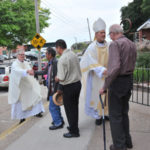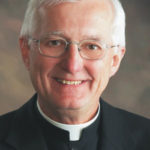Father Stephen Page, in his role as pastor of St. Joseph Parish in DeWitt, which operates a thriving Catholic school, is exercising another role: faithful citizen. Last weekend, he sent an email urging Iowans on his email list to weigh in on Gov. Kim Reynolds’ proposed reform of the Area Education Agency (AEA) system.
He believes the proposed legislation (read about it on Page 1), would be detrimental to accredited nonpublic and rural public school districts. Iowa’s system of nine AEAs is “complex and comprehensive in the services and support they provide …” he wrote in his email. He encourages Iowans to contact their legislators to keep the AEAs intact. Visit (legis.iowa.gov/contacts) for contact information.
His call to action, early in the Iowa General Assembly’s 2024 session, is one example of how faithful citizens can engage in the political and legislative process. The U.S. Conference of Catholic Bishops’ (USCCB) statement, “Forming Consciences for Faithful Citizenship” provides excellent guidance on fostering the common good in the public square.
“Catholics from every walk of life can bring their faith and our consistent moral framework to contribute to important work in our communities, nation, and world on an ongoing basis, not just during election season,” the statement’s introductory letter says. “In this coming year and beyond, we urge leaders and all Catholics to respond in prayer and action to the call to faithful citizenship. In doing so, we live out the call to holiness and work with Christ as he builds his kingdom of love.”
Guiding us in our participation in the public square are four basic principles of Catholic social doctrine: the dignity of the human person, the common good, subsidiarity and solidarity. Keeping these principles front and center better equips us to evaluate policy positions, party platforms and candidates’ promises and actions in light of the Gospel and Church teaching and thus help to build a better world.
“Catholics may choose different ways to respond to compelling social problems, but we cannot differ on our moral obligation to help build a more just and peaceful world through morally acceptable means, so that the weak and vulnerable are protected and human rights and dignity are defended,” the bishops say.
At press time, the Iowa Caucuses were underway to determine which Republican candidates will advance in the race for the Republican nomination for president. Now is the perfect time to read “Forming Consciences for Faithful Citizenship” (http://tinyurl.com/ysu2aeee) to discern how to apply Church principles to the candidates and the issues they embrace as we move toward the Nov. 5 presidential election.
The bishops’ statement also applies to discerning legislative proposals in the Iowa General Assembly. Prepare to learn more about and to engage in advocacy on these issues. Start with Gov. Reynolds’ proposals — from AEA reform and parental choice in education to Medicaid expansion for new moms in need and acceleration of income tax relief. You can read more about her proposals in the Iowa Catholic Conference (ICC) article in this week’s issue.
The ICC, the public policy voice for Iowa’s bishops, also helps to educate Catholics as they participate in the public discussion about policy and law that affects the state of Iowa. “Understanding the basics of the legislative process and how to communicate with legislators is an important part of ensuring our participation is effective and relevant,” the ICC states. Read more about that process (http://tinyurl.com/569p3prs).
Tonight (Jan. 18), the ICC is hosting a webinar via Zoom at 7 p.m. on advocacy efforts early in the Iowa legislative session. The Catholic Messenger will continue to update readers on the ICC’s advocacy work. You can also sign up for its action alerts (iowacatholicconference.org/voter-voice). Take time to visit the ICC website, which offers news updates, issues and resources (iowacatholicconference.org).
Educated, informed and inspired, we are better equipped to advocate for the common good, which places priority on the least among us. When they thrive, we all thrive. Our legislators need to hear from us. Father Page is asking us to lead the way.
Barb Arland-Fye, Editor
(arland-fye@davenportdiocese.org)












